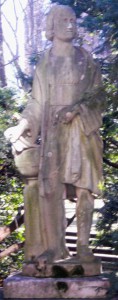
When one is raised in Boston, one of the standard field trips in school is to walk the Freedom Trail. How lucky I was. Years later, when a family member moved to Beacon Hill, I became infatuated with this lovely section of Boston: gas lit lamps, cobblestone streets, wrought iron fences. What’s not to love?
And then I discovered Louisburg Square. I can sum it up in one word: charming. If one lives here, one owns shares in the park in the square. On either end of this fenced-in park are two statues. Thinking about these statues one day, my curiosity got the best of me. I became obsessed with finding out all I could about them, and why they were there.
The garden in which these two statues are placed has been described as “… a beautiful location in the western section of our city, surrounded by the residences of many of our most distinguished and fashionable families. This place affords one among many evidences that taste and refinement are gradually beautifying our city, and by-and-by Boston will represent many outdoor specimens of the fine arts worthy of her character as the literary emporium and Athens of America.”[1]
In 1846, ship-owner Joseph Iasigi[2] paid $19,000 for a new brick house at 3 Louisburg Square.[3] Four years later, he purchased a statue of Aristides the Just (530-468 B.C.) for the neighboring park. Aristides was known to be so fair and honest in all that he did that men said, “There is not in all Athens a man so worthy or so just as he.”[4] When the marble statue arrived in Boston, Iasigi announced his intentions to his neighbors. The neighbors hemmed and hawed about placing a Greek statue in their revered Louisburg Square and appointed a committee of three to think it over. When Joseph added that he would also import a statue of Christopher Columbus, they wholeheartedly agreed to both.[5] Both statues are still standing today in Louisburg Square, representing 1850s Brahmin culture at its finest.
Joseph Iasigi died in Boston on 22 May 1877.[7] Both Joseph and his wife, Eulalie, are buried at the historic, beautifully landscaped Mount Auburn Cemetery in Cambridge, Massachusetts. Although they have passed on, their memory remains. Not only do the two marble statues still stand in Louisburg Square to remind us of this family, but Oscar Iasigi’s gift of a stained glass window in Boston’s Cathedral of the Holy Cross honors his father Joseph as well. As you walk through the vestibule toward the sanctuary, you will see this beautiful stained glass window, the third window on the left.
Notes
[1] Phebe S. Goodman, The Garden Squares of Boston (Lebanon, N.H.: University Press of New England, 2003), p. 45.
[2] Samuel Eliot Morison, The Maritime History of Massachusetts, 1783-1860 (1922), p. 292.
[3] Suffolk County, Massachusetts Deeds, Grantee Index 1800-1899, 569: 258.
[4] Heritage History page for Aristides the Just.
[5] Life (magazine), 5 February 1945, pp. 7–8.
[6] Massachusetts Vital Records, Deaths, Boston, 294: 101.
What’s not to love? It’s in the city, not the country.
BTW, the Life Magazine reference (#5) can be viewed online: https://books.google.com/books?id=J1MEAAAAMBAJ&q=Louisburg. It quotes a passage from Eleanor Early’s 1930 book, “And this is Boston!” (https://books.google.com/books?id=XCUXAAAAIAAJ&focus=searchwithinvolume&q=Iasigi)